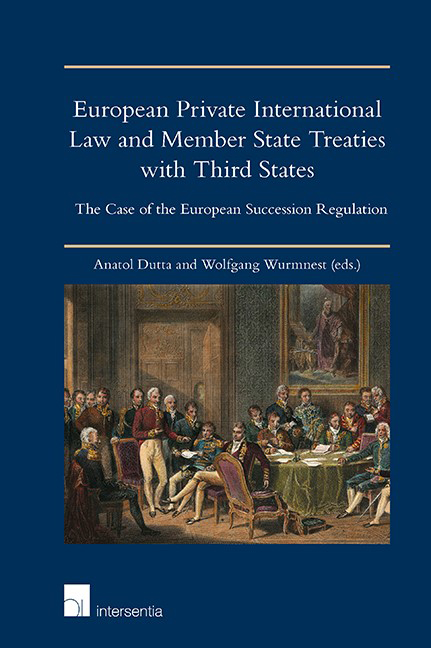 European Private International Law and Member State Treaties with Third States
European Private International Law and Member State Treaties with Third States Book contents
- Frontmatter
- Foreword
- Contents
- List of Treaties and Conventions
- List of Abbreviations
- List of Contributors
- Introduction
- Questionnaire
- PART I THE PERSPECTIVE OF EU MEMBER STATES
- PART II THE PERSPECTIVE OF THIRD STATES
- PART III THE PERSPECTIVE OF THE EUROPEAN UNION AND A COMPARATIVE OUTLOOK
- Annex
- Index
- About the Editors
Introduction
Published online by Cambridge University Press: 12 November 2019
- Frontmatter
- Foreword
- Contents
- List of Treaties and Conventions
- List of Abbreviations
- List of Contributors
- Introduction
- Questionnaire
- PART I THE PERSPECTIVE OF EU MEMBER STATES
- PART II THE PERSPECTIVE OF THIRD STATES
- PART III THE PERSPECTIVE OF THE EUROPEAN UNION AND A COMPARATIVE OUTLOOK
- Annex
- Index
- About the Editors
Summary
In the last decade, the European Union (EU) has unified large segments of private international law for its Member States. The enacted Regulations take precedence over national private international law rules and also over international treaties concluded between the Member States, as far as EU law does not provide otherwise. However, existing bilateral and multilateral treaties concluded by Member States with third States enjoy priority over European private international law rules. This priority rule, which can be found in most of the private international law Regulations adopted so far, has been described as the ‘Achilles heel’ of the European conflict-of-law system. It hampers the uniform application of EU law and creates friction with harmonized procedural rules. In addition, the legal relationships for a considerable number of third State citizens and – as far as the treaties are universally applicable – even all covered relationships are not governed by EU private international law but by rules laid down in international treaties, which in part date back to the beginning of the 20th century.
The implications of this pluralism on the functioning of the rather new European private international law rules have not yet been explored in depth. The various international treaties or conventions concluded by the current Member States have neither been comprehensively collected nor has their content been analyzed in a systematic manner. This book, which is the fruit of an international working group set up by the Universities of Augsburg and Munich in 2017, aims to partly fill this gap by starting with a kind of ‘test drilling’ in the area of succession upon death. Reporters from various EU Member States loosely representing the ‘four corners of the EU’ analyze the scope and effect of treaties and conventions concluded by their countries with third States in the area of succession law and analyze their impact on the functioning of the European Succession Regulation (Regulation No. 650/2012, hereafter: SR). As in other EU instruments, Article 75(1)1 SR provides that its rules do not affect bilateral treaties concluded with third States before the Regulation was enacted. The reports contained in this book cover Austria, Belgium, Croatia, the Czech Republic, Finland, France, Germany, Italy and Sweden. The comparative report at the end of this book also takes into account treaties concluded by Estonia and (without claiming completeness) by Greece.
- Type
- Chapter
- Information
- European Private International Law and Member State Treaties with Third StatesThe Case of the European Succession Regulation, pp. 1 - 4Publisher: IntersentiaPrint publication year: 2019
- 1
- Cited by


